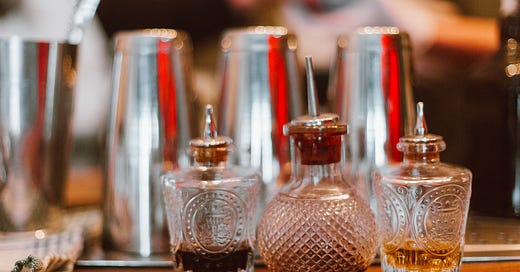Bitter Herbs for Indigestion
Dyspepsia is a common digestive complaint. There are some herbs that may help.

Dyspepsia, or indigestion, is a common condition associated with eating habits, especially after a large meal. Symptoms can range from heartburn, nausea, pain, abdominal cramping, and distension. In traditional medicine, treatments have often been based on the consumption of bitter herbs to stimulate production of saliva, gastric juices, or bile. You may be familiar with the use of an apertif, common in European cuisine, which is a bitter beverage consumed before beginning a large meal. Here, I review three plants commonly used in the management of dyspepsia: wormwood, gentian, and artichoke.
Wormwood

Wormwood is used as a bitter tonic to help digestion, as a choleretic to improve bile flow, and in the past, it was used to treat worm infections. Drinking wormwood as a tea is generally safe, but its essential oil and the liqueur absinthe, which is made from an alcohol extract of the plant, can be dangerous in large amounts because of a substance called thujone. Thujone can be harmful to the brain and cause hallucinations and long-term mental health problems if consumed in large doses. Therefore, it's important to use wormwood products that don't contain thujone. The practice of using wormwood to treat indigestion is mostly based on traditional knowledge rather than clinical studies.
Artichoke

Some studies suggest that artichoke leaf extract might help lower cholesterol levels, although the effect seems to be slight. This extract has shown promise in protecting the liver, promoting bile flow, and reducing both cholesterol and triglyceride levels by blocking the production of cholesterol. Additionally, artichoke extracts can ease symptoms of indigestion and irritable bowel syndrome (IBS), improving issues like the ability to digest fats, bloating, gas, constipation, abdominal pain, and nausea. The beneficial effects are believed to come from the bitter compounds in the leaves, specifically the sesquiterpene lactones cynarin and cynaropicrin.
Yellow Gentian

Yellow gentian, a main ingredient in the Alpine drink known as Enzianschnaps, is at risk due to overharvesting in its natural habitats across the mountainous areas of Europe and western Asia. The plant's incredibly bitter taste comes from compounds called monoterpenoids, specifically gentiopicroside and amarogentin. People have traditionally used yellow gentian to help with issues like a lack of appetite, gas, and bloating, although there isn't much clinical research to back up these uses. However, laboratory studies have shown that extracts from the gentian plant can trigger the release of digestive juices in stomach lining cells.
The Takeaway
Each of these three species boasts a long history of traditional use in treating symptoms associated with indigestion. Although clinical studies are largely absent, the bitter chemistry of these plants has been explored, and there is some laboratory evidence supporting their use. Whether you consume bitters to enhance your appetite, lower the risk of dyspepsia, or simply savor the flavor, these ingredients add an intriguing layer of medicinal history to your dining experience.
Yours in health, Dr. Quave
Cassandra L. Quave, Ph.D. is a scientist, author, speaker, podcast host, wife, mother, explorer, and professor at Emory University School of Medicine. She teaches college courses and leads a group of research scientists studying medicinal plants to find new life-saving drugs from nature. She hosts the Foodie Pharmacology podcast and writes the Nature’s Pharmacy newsletter to share the science behind natural medicines. To support her effort, consider a paid or founding subscription, with founding members receiving an autographed 1st edition hardcover copy of her book, The Plant Hunter.
Available in hardcover, paperback, audio, and e-book formats!






I kind of wanted to be a beatnik poet in The Village, sipping on absinthe in some speak easy, writing amazing stuff and starving. Fortunately I didn't follow that path I guess, especially with the thujone! There are some "speak easies" in Manhattan but it's more of a gimmick I think, and I haven't been since becoming a dad. Mint tea does the opposite for me, inducing some reflux. I think you've written about this previously, too, so thanks for that!